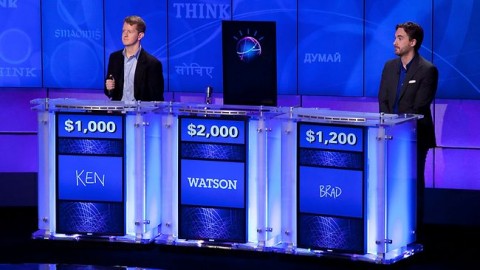
Image from web.
Are you serious, Ken Jennings? Final Jeopardy is no time for Simpsons quotes.
Let’s make light of possibly the biggest development in the decline of humanity since Terminator and Facebook. The two best Jeopardy! players of all time (Ken Jennings holds the record for longest winning streak with seventy-four games and Brad Rutter has won more money than any other contestant with $3,255,102) were destroyed by a machine—an overly polite machine called Watson.
But who or what is this Watson? At first glance, it seems that he is just a dwarf in a big, psychedelic metal locker, comically pulling levers while consulting Wikipedia at lightning-fast speeds. In actuality, it is a highly sophisticated A.I. (artificial intelligence, not Allen Iverson) project concocted by IBM. Its aim is to further develop computer sensitivity to natural human language, a daunting process with which scientists have been struggling for decades. Whereas previous computer systems could answer questions asked in a straightforward fashion, Watson can untangle the nuances of questions asked in riddle form or in nonstandard language, like vernacular or colloquialism. It is a major breakthrough in the way humans and machines interact. The creators of the project thought Jeopardy! would be a perfect stage on which to test this new technology, since the questions on the game show are asked in an answer-question style, rather than its more traditional opposite. Watson proved to be a serious contender.
As I watched the second round of the three-episode series, my depression started to sink in. What began as a close match became a slaughter for the machine. With categories such as “Don’t Worry About It” and “Hedgehog Podge,” one would think that the humans would have the game locked down. The names of such categories require one to make off-kilter connections and to relate the answers back to the category names.
It was truly amazing to watch Watson, though. His tone was artificial but oddly conversational as he (or it) buzzed in. The screen would show his top three ‘thought processes’ and to what percent he was certain of the answer. The answer that matched at the highest percentage would be the one he blurted out; he was correct almost every time. There was no smile after a right answer, just swirls of circles and line segments in neon green, floating around where a face should be. There were notable instances where he was very wrong: once, the show’s host Alex Trebek asked a question about a specific art movement and he answered “Picasso.” Right after that, though, he got a tricky old-school Saturday Night Live question right. Overall, he navigated the board with expertise and swiftness, stacking Daily Doubles and wagering ridiculously specific amounts (“I’ll wager one thousand two hundred and fifty six, Alex”).
Watson, with his four terabyte hard drive and fifteen-terabytes of random access memory (not to mention full texts of encyclopedias, dictionaries, novels, plays and of course Wikipedia), ultimately won the competition and proceeded to make mankind slightly more obsolete. What are the philosophical implications of a machine that can respond so quickly and accurately to human language? Are more and more jobs at stake? Was Kurt Vonnegut right all along? Should I brush up on that Haley Joel Osment movie A.I.? Only time will tell how much this technology will affect our lives. All we can do for now is revel in the fact that we can build these machines and they can’t build us (yet). I, for one, will never welcome our computer overlords. And I hope I don’t have to continue to watch them beat my fellow Homo sapiens on Jeopardy! •










[…] This post was mentioned on Twitter by Sound Bytes, Henry Cowell. Henry Cowell said: Elementary, My Dear Watson: IBM computer program trounces human …: Its aim is to further develop computer sens… http://bit.ly/eozBn1 […]